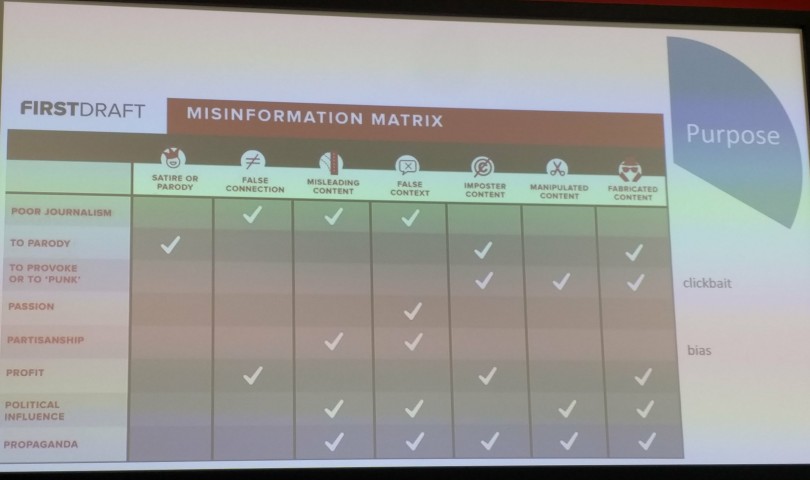ARLG NE group organized a day-long event which I attended called Get real! Libraries on the frontline – navigating a fake news, post-truth world.
On the day, we gathered in Newcastle’s new Science Central, which was a great new building, albeit still quite a construction site. The event comprised three talks in the morning and then an afternoon of participation and discussion.
We worked from a definition of fake news as ‘knowingly fabricated stories, published either for profit or financial purposes’ (Goodman, 2017).
The first and most interesting talk was led by two social science researchers from the National Literacy Trust, Irene Picton (Senior Programme Manager) & Anne Teravainen (Research Manager). They gave a useful introduction to the idea of ‘critical literacy’: challenging the power relationship between author and reader, looking at author intent, understanding what is included as well as what is missing from a text or debate.
Their approach was very much focussed on what schools and teachers can, should and are doing to develop critical literacy from the moment that children become verbal. The consensus on the day was that students need to have begun building up these skills well before they enter university.
Two questions we discussed: where does the responsibility lie for developing critical literacy: family, teachers, media itself, librarians? Could we require authors, pupils and students to ‘show their work’ when stating claims, the same as we ask them to ‘show their work’ in mathematics?
Joy Cadwallader, Academic Engagement Librarian at Aberystwyth University and also Lisa Eveson, Academic Librarian for Computing, Media and the Arts at Teesside University shared examples of what they have done to embed teaching about ‘fake news’ into their subject area and how their have created a bookable ‘fake news’ workshop. Joy had designed a debate where she had half the class defend Wikipedia’s decision to ban the Daily Mail as a source for its articles, and half the class defend the Daily Mail.
Another interesting idea came from the creator of University of Newcastle’s Fake News Libguide. She embedded a timeline of ‘fake news’ to show how the concept has existed in different eras from now. A suggestion came from the audience that she take suggestions from students for what to include in her timeline, and give sweets or a token reward for the best suggestions, which would then be included in the timeline.
Other teaching materials shared in the afternoon were:
- an idea to demonstrate that even things that look like they have an academic stamp of approval might not have been edited or reviewed before being published. I thought these both might be a useful example for cpd for our academics at Sunderland.
- ‘Get me off your f*&&ing mailing list’ as an example of a paper which was actually published by a predatory journal.
- Nonsense article submitted by a researcher to a physics conference.
- Fake news game from the BBC: BBC iReporter. Designed for secondary school but might be useful for FDN or some of our students in other contexts.
- Flying Penguins video – ask students how they would verify whether penguins can fly or not.
My takeaway from the day is that simply presenting students with facts and presenting ourselves as trusted sources of information isn’t enough to fight fake news. Developing critical literacy from an early age is crucial to this. Next on my reading list is this article entitled ‘Why librarians can’t fight fake news‘ by MC Sullivan.
Bibliography
Goodman, E. (2017) “The evolving conversation around fake news and potential solutions” Media Policy Project Blog 10/08. Available at http://blogs.lse.ac.uk/mediapolicyproject/2017/08/10/the-evolving-conversation-around-fake-news-and-potential-solutions/.
Sullivan, MC (2018) ‘Why librarians can’t fight fake news’ Journal of Librarianship and Information Science, preprint. Available at https://doi-org.ezproxy.sunderland.ac.uk/10.1177/0961000618764258.
